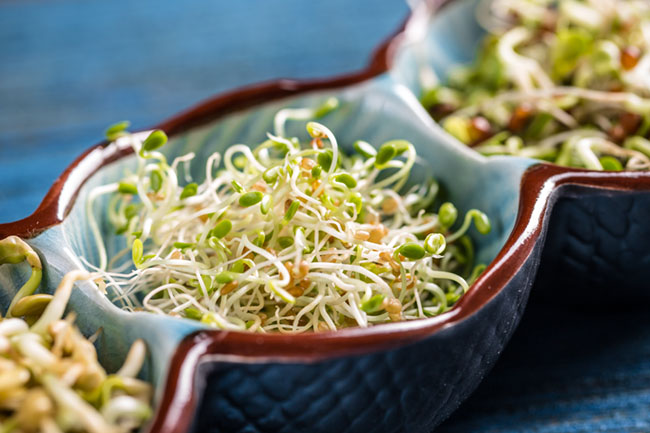Menopause is a natural stage of life, but it often comes with unwanted symptoms—hot flashes, night sweats, mood changes, and decreased bone density. While hormone replacement therapy (HRT) can be effective, some women seek plant-based alternatives to support their wellbeing. One such option gaining scientific attention is red clover sprouts.
What Are Red Clover Sprouts?
Red clover (Trifolium pratense) is a flowering plant in the legume family, traditionally used in herbal medicine. When sprouted, red clover seeds transform into a nutrient-dense food packed with enzymes, vitamins, and most notably—isoflavones.
Isoflavones are phytoestrogens—plant compounds that mimic the effects of oestrogen in the body. This is particularly relevant during and after menopause, when natural oestrogen levels decline.
Key Benefits for Menopausal Women
🌿 Hormonal Balance with Phytoestrogens
Red clover sprouts are rich in bioavailable isoflavones like genistein, daidzein, formononetin, and biochanin A. These compounds bind to oestrogen receptors in the body and may help alleviate menopausal symptoms.
🧬 Study Spotlight: A 2021 double-blind, placebo-controlled trial published in PLOS One found that red clover isoflavones significantly reduced hot flashes and improved quality of life in peri- and postmenopausal women over 12 weeks [PMID: 33793699].
💪 Bone Health Support
Oestrogen plays a vital role in maintaining bone density. The decline during menopause increases the risk of osteoporosis. Some research suggests red clover isoflavones may support bone mineral density.
🔬 A review in The American Journal of Clinical Nutrition noted that phytoestrogens may have a mild protective effect on bone loss in postmenopausal women.
❤️ Cardiovascular Support
Menopause is associated with changes in cholesterol levels and vascular health. Red clover sprouts may help by promoting improved blood lipid profiles.
📊 A study published in Menopause journal showed that red clover supplementation helped reduce LDL (“bad”) cholesterol and raised HDL (“good”) cholesterol in postmenopausal women.
😌 Mood and Cognitive Health
While research is ongoing, some studies point to phytoestrogens’ potential neuroprotective effects, which may support mood regulation and cognitive clarity during hormonal shifts.
How to Add Red Clover Sprouts to Your Diet
- Toss them into salads or wraps
- Add to smoothies for a phytoestrogen boost
- Use as a crunchy topping on soups or omelettes
- Combine with other sprouts (e.g. broccoli or alfalfa) for variety
If you don’t want to grow them at home, red clover sprout supplements are also available—but be sure to choose high-quality, additive-free options.
Are Red Clover Sprouts Safe?
Red clover is generally well tolerated when consumed in food form. However, due to its mild oestrogenic effects:
- Women with hormone-sensitive conditions (like breast or uterine cancer) should consult a healthcare provider.
- If you’re on blood-thinning medication, check with a doctor, as red clover may affect clotting.
Final Thoughts
Red clover sprouts offer a simple, food-based way to support women navigating menopause. Backed by emerging science, these sprouts are more than just a salad topping—they’re a natural tool to support hormonal balance, bone density, and cardiovascular wellness.
As always, speak with your doctor before adding any new food or supplement to your routine—especially if you have underlying health conditions or are on medication.


